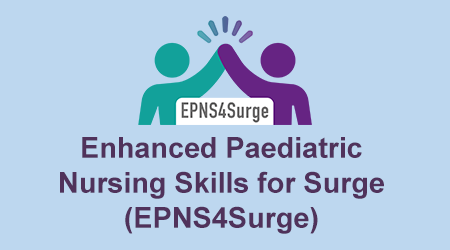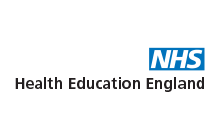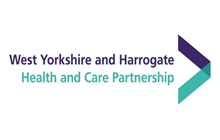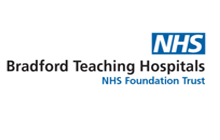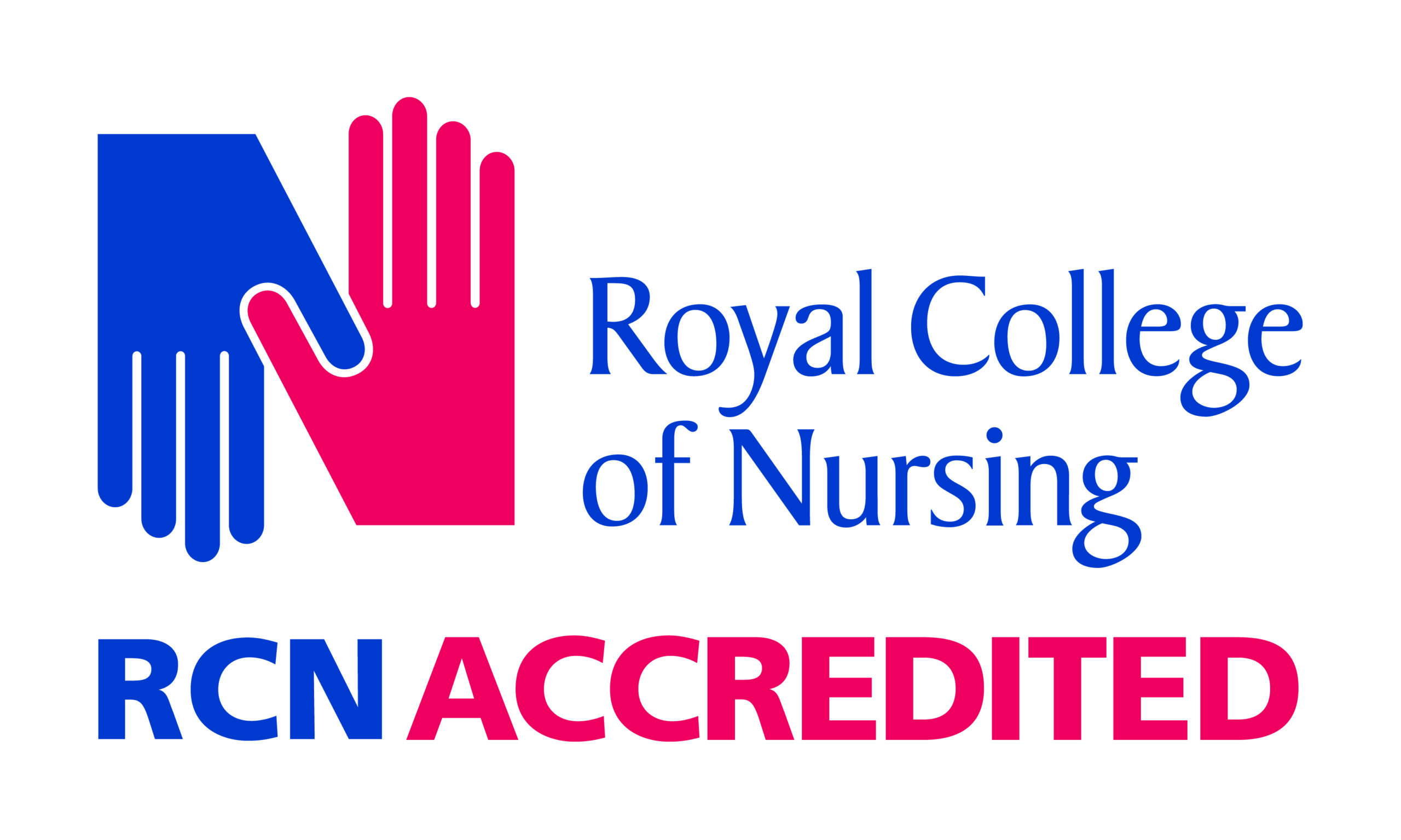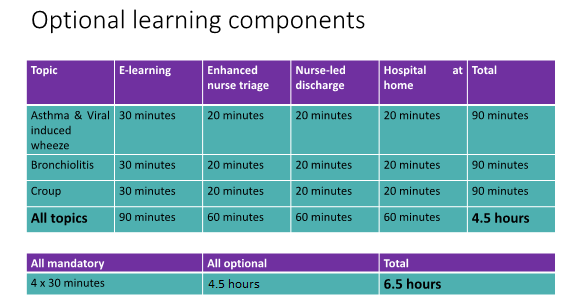About the EPNS4Surge course
The EPNS4Surge course has been designed for nursing staff looking after children with respiratory illness. It provides the knowledge and skills to enhance the delivery of care for children and young people with bronchiolitis, croup, asthma and viral induced wheeze. There is also an emphasis on how sepsis may mimic or present alongside these common conditions.
Supporting patient flow and creating capacity where possible is key to ensuring the safe and efficient care of our children and young people. Nurses are experienced in recognising and managing children with respiratory problems. The EPNS4Surge course builds on this and provides specific training to enable the development of new workflows, including:
- Enhanced nurse triage
- Nurse-led discharge
- Hospital at home care
These enhanced skills should help support patient flow and create capacity.
During winter months hospitals often experience a ‘surge’ in the number of respiratory admissions to paediatrics. This resource can be an integral part of ‘surge planning’ in combination with staff support and team development.
The course is freely available to all NHS staff and has been designed to be flexible in timescale for completion, with the option of tailoring teaching components to meet local needs.
Handbooks have been created to enable course leaders to implement EPNS4Surge within their local trusts, with clinical frameworks available for adaptation to ensure good governance.
Primary and secondary audiences
This course is primarily aimed at nursing staff of band 5 and higher, working in a paediatric environment. This could be the children’s assessment unit, an in-patient ward, emergency departments, community settings, primary care, or in the patients’ home.
The teaching content may also be useful for nurses who are not trained in paediatrics but may come into increased contact with unwell children during busy periods. This might include emergency department nursing staff who have adult training but may be required to help treat children during periods of high volume and limited capacity.
Engaging in the course will provide an opportunity to enhance local paediatric service delivery.
-
Documents to run and structure the course locally
Documents to run and structure the course locally
Course documentation includes the course lead handbook, supervisor handbook, and student handbook. Course leaders should use this to help implement the course within their local trusts. Students and supervisors should use their handbooks to orientate themselves to learning requirements.
Click here to launch the Course handbook folder in the elfh hub
-
elearning
elearning
There are 4 elearning modules as part of EPNS4Surge, on bronchiolitis, croup, asthma and viral induced wheeze, and the anatomy and physiology of the respiratory system. They have been designed to be completed before undertaking clinical placement-based learning.
Click here to launch the elearning folder in the elfh hub
-
Clinical teaching
Clinical teaching
We have provided clinical scenarios to illustrate key concepts and stimulate discussion. Recorded versions are available, however local teams have the option to deliver these themselves using the slides provided.
Click here to launch the Clinical teaching folder in the elfh hub
-
Placement-based learning
Placement-based learning
Placement learning is an essential component of the course to develop and refine clinical skills. We would encourage students and supervisors to be flexible and opportunistic with their training. Work-place based assessments should be completed by senior colleagues and reviewed by supervisors to monitor progress and for students to build confidence.
Click here to launch the Clinical placement folder in the elfh hub
-
Simulation and OSCE (objective structured clinical examination) sign-off scenarios
Simulation and OSCE (objective structured clinical examination) sign-off scenarios
Simulation is not an essential part of the course, but scenarios have been provided for the supervisors to deliver as an optional component. The final OSCE scenario and competency sign-off is completed by the students’ supervisor at a final meeting.
Click here to launch the Assessment folder in the elfh hub
Supplementary documents
All documents have been provided by the Ambulatory Care Experience (ACE) Hospital at Home team based at the Bradford Teaching Hospital Foundation Trust (BTHFT). The documents provide a guide for nurses working in hospital and in the community. It also provides clear governance for hospital clinicians who take clinical responsibility for each child on the caseload. The documents can be used and adapted to meet local needs and context.
Click here to launch the Supplementary Documents folder in the elfh hub
- ACE team governance documents
- Nursing documentation templates
- Asthma and viral induced wheeze documents
- Croup documents
- Bronchiolitis documents
Certification
On completion of all course content along with supervisor sign-off, learners will be provided with a certification of completion from the EPNS team in association with the University of Bradford.
Students wanting to progress their learning can use this certificate towards the Masters-level fully-accredited EPNS module at the University of Bradford.
Meet the team

Dr Ben Hughes
Specialty Trainee in Paediatrics, West Yorkshire
Dr Mathew Mathai
Consultant Paediatrician, Project Sponsor and Chair, BTHFT
Dr Megan Dale
Specialty Trainee in Paediatrics, West Yorkshire
Ms Dawn Hare
Advanced Paediatric Nurse Practitioner and Content Development, BTHFT
Michael Tatterton
Associate Professor and Field Lead for Children and Young People’s Nursing at University of Bradford; Specialist Advisor at CQC; Associate Editor Journal of Child Health Care
Emma Nye
Programme Manager, HEE eLearning for Healthcare
Robin Pollard
Project Manager, HEE elearning for Healthcare
Naomi Knight
Graphic Designer, HEE elearning for healthcare
Louise Garrahan
Communications and Stakeholder Officer, HEE elearning for healthcare
Acknowledgements
Content creation
- Dr Ben Hughes, Specialty Trainee in Paediatrics West Yorkshire and Health Education England Leadership Fellow
- Dr Mathew Mathai, Consultant Paediatrician, BTHFT
- Dr Megan Dale, Specialty Trainee in Paediatrics, West Yorkshire
Content review
- Ms Laura Deery, Practice and Professional Development Sister for Paediatrics, BTHFT
- Ms Samantha Burns, Yorkshire & Humber Paediatric Critical Care Operational Delivery Network Educator
EPNS National Stakeholder Advisory Board:
- Dr Sanjay Patel, Clinical lead for the Healthier Together programme, Wessex and Consultant Paediatrician in Infectious Diseases, University Hospital Southampton NHS Trust
- Dr Damian Roland, Associate Professor at Leicester University and Consultant in Paediatric Emergency Medicine, University of Leicester NHS Hospital Trust
- Dr Victoria Hemming, Consultant in General Paediatrics, Mid Yorkshire Hospitals NHS Trust
- Dr Bob Phillips, Consultant Paediatric Oncologist at Leeds Teaching Hospital NHS Trust and Senior Clinical Academic at the Centre for Reviews and Dissemination, University of York
- Ms Karen Perring, Network Manager and Lead Nurse for Yorkshire & Humber Paediatric Critical Care Operational Delivery Network
- Ms Julie Flaherty, Consultant Nurse in Paediatric Emergency Medicine, Greater Manchester Health and Social Care Partnership
- Dr Omowunmi Akindolie, Consultant in Ambulatory Paediatrics, King’s College Hospital NHS Trust
- Dr Tallal Hussain, Consultant Paediatrician with special interest in High Dependency Care, BTHFT
- Dr Catriona McKeating, Consultant Paediatrician with special interest in Palliative Care, BTHFT
- Ms Zoe Tribble, Lead Nurse for Integrated Children’s Nursing at the Royal London Children’s Hospital NHS Trust, and Chair of the National forum for Children’s Hospital at Home
- Ms Nubi Jones, Young person representative and advocate in Bradford
Content delivery
- Dr Sindugaa Sivasubramaniam, Specialty Trainee in Paediatrics, West Yorkshire
- Dr Anne Pinches, Senior Paediatric Clinician, BTHFT
- Ms Emma Morrison, ACE Team lead, BTHFT
- Ms Lucy Fletcher, ACE Team nurse, BTHFT
- Dr Mathew Mathai, Consultant Paediatrician, BTHFT
- Ms Dawn Hare, Advanced Paediatric Nurse Practitioner, BTHFT
- Dr Laura Myers, HEE Leadership Fellow and Specialty Trainee in Paediatrics, South Yorkshire
Course guarantors
- Dr Helen Jepps, Consultant Paediatrician and Children’s Clinical Business Unit Director, BTHFT
- Mr Rob Guest, General Manager for Children’s services, BTHFT
- Ms Kay Rushforth, Associate Director of Nursing for Children and Neonatal Services , BTHFT
- Michael Tatterton, Associate Professor and Field Lead for Children and Young People’s Nursing at University of Bradford; Specialist Advisor at CQC; Associate Editor Journal of Child Health Care
- Kirsty Lowery-Richardson, Workforce Transformation Lead, West Yorkshire and Harrogate H&C Partnership
How to Access
In order to access any elfh programme, you will need an elfh account. If you do not have one, then you can register by selecting the Register button below.
If you already have an account with elfh, then you can enrol on to the The EPNS4Surge programme by logging in to the elfh Hub, selecting My Account > Enrolment and selecting the programme. You can then access the programme immediately in the My e-Learning section.
Not an NHS organisation?
If you are not an NHS health or care organisation and therefore do not qualify for free access elfh Hub, you may be able to access the service by creating an OpenAthens account.
To check whether or not you qualify for free access via OpenAthens, you can view the eligibility criteria and register on the ‘OpenAthens’ portal.
Registering large numbers of users
If you are a HR, IT or Practice Manager and would like to register and enrol large numbers of staff within your organisation for access onto The EPNS4Surge programme, please contact elfh directly.
More information
Please select the following link for more information on how to use the elfh Hub.



